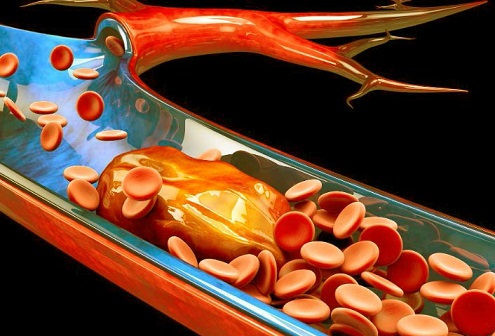Understanding the role of antibodies and complement in thrombosis, a new path to treatment
Sebastian Lavoie Fact checked by:Thailand Medical News Team Sep 05, 2024 7 months, 3 weeks, 18 hours, 32 minutes ago
Medical News: Recent research has uncovered a critical mechanism driving thrombosis, or blood clotting, involving antibodies and the complement system. This
Medical News report provides insight into the findings and their implications for treating thrombosis without risking excessive bleeding, which is a common side effect of conventional therapies.
 Understanding the role of antibodies and complement in thrombosis, a new path to treatment
A Fresh Perspective on Thrombosis
Understanding the role of antibodies and complement in thrombosis, a new path to treatment
A Fresh Perspective on Thrombosis
Venous thromboembolism (VTE) is a serious condition that occurs when a blood clot forms in a vein, which can lead to fatal complications. The current therapies aimed at preventing these clots, like anticoagulants, often come with an inherent risk of bleeding. This challenge has driven researchers to investigate the role of antibodies and the complement system in thrombosis, potentially offering a safer solution. The study, conducted by researchers from the University Hospital LMU Munich-Germany, San Raffaele Scientific Institute-Italy, and others, has revealed new insights into how the immune system contributes to clot formation.
The study explores how antibodies, particularly IgM and IgG, work together with the complement system to drive thrombosis. The findings could pave the way for more targeted therapies that prevent clotting without affecting normal blood function.
Key Mechanisms Involving Antibodies
The research demonstrates that antibodies, specifically IgM and IgG, play a central role in triggering thrombosis, regardless of the specific antigens they target. Under conditions of reduced blood flow, IgM binds to endothelial cells lining the blood vessels through receptors like FcmR and pIgR. This binding initiates a series of events, including the recruitment of platelets, which are essential for clot formation. This article emphasizes that the mechanism uncovered by the researchers could also be observed in humans, not just in mouse models.
IgM activates endothelial cells, causing them to expose von Willebrand factor (vWF) and P-selectin, which are proteins crucial for attracting platelets to the vessel wall. Once the platelets are recruited, the procoagulant surface of these activated platelets allows IgG to bind, regardless of its antigen specificity. This binding activates the classical complement pathway, which then sets off a chain reaction that promotes further clot formation.
The Complement System’s Role in Thrombosis
The complement system, a crucial part of the immune response, is activated when IgG binds to platelets. This activation amplifies the body’s clotting response, creating a vicious cycle that drives the formation of dangerous blood clots. Importantly, the researchers showed that inhibiting the complement system could prevent thrombosis without affecting hemostasis, or the body’s ability to stop bleeding after an injury.
This discovery holds significant therapeutic potential. By targeting the complement system, it may be possible to t
reat thrombosis without the bleeding risks associated with current anticoagulant therapies. For instance, blocking specific complement components, like C1q or C3, effectively reduced clot formation in the study's mouse models.
Study Findings and Human Implications
The study's findings highlight the importance of antibodies and the complement system in thrombosis. In addition to identifying IgM as a key player in the initiation of clot formation, the researchers showed that IgG, which propagates clot formation, does so by activating the complement pathway. The research also pointed out that the role of IgM and IgG in thrombosis is not tied to their antigen-binding properties. This means that even in the absence of a specific antigen, these antibodies can trigger clot formation.
In human varicose veins and COVID-19 patients, researchers found evidence of the same antibody-driven mechanism of thrombosis observed in mice. This finding suggests that the therapeutic strategies developed in animal models could be applicable to humans. Specifically, the study found that IgM and IgG deposited onto the endothelial cells and platelets in human veins under conditions of reduced blood flow, just as they did in the mouse models.
The researchers further tested complement inhibition as a potential therapeutic approach in mouse models and found it to be highly effective in reducing thrombosis without compromising hemostasis. These results suggest that targeting the complement system could be a safer and more effective way to prevent thrombosis in humans.
Conclusions
The study provides groundbreaking insights into the role of antibodies and the complement system in thrombosis. These findings could have significant implications for treating thrombosis, especially for patients at high risk of both clotting and bleeding. By targeting the complement system, researchers believe it is possible to develop therapies that prevent blood clots without increasing the risk of bleeding, which is a common side effect of traditional anticoagulant treatments.
As research continues, the goal will be to refine these therapeutic strategies to ensure they are effective and safe for use in humans. The discovery that antibodies and complement can drive thrombosis opens up new possibilities for treating this life-threatening condition in a more targeted and safer way.
The study findings were published in the peer-reviewed journal: Immunity.
https://www.cell.com/immunity/fulltext/S1074-7613(24)00406-0
For the latest on thrombosis, keep on logging to Thailand
Medical News.
Read Also:
https://www.thailandmedical.news/news/unveiling-the-uniqueness-of-covid-19-induced-thrombosis
https://www.thailandmedical.news/news/how-4g-5g-gene-polymorphisms-influence-covid-19-severity-and-thrombosis-risk
https://www.thailandmedical.news/news/warning-increasing-incidences-of-cerebral-venous-sinus-thrombosis-cvst-in-many-who-had-omicron-coincidences,-correlation-or-causal
